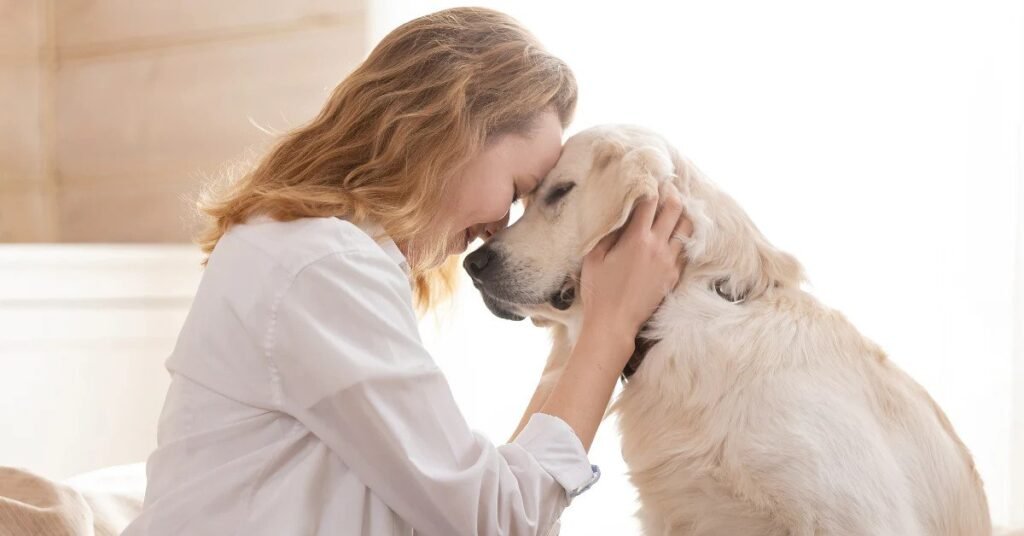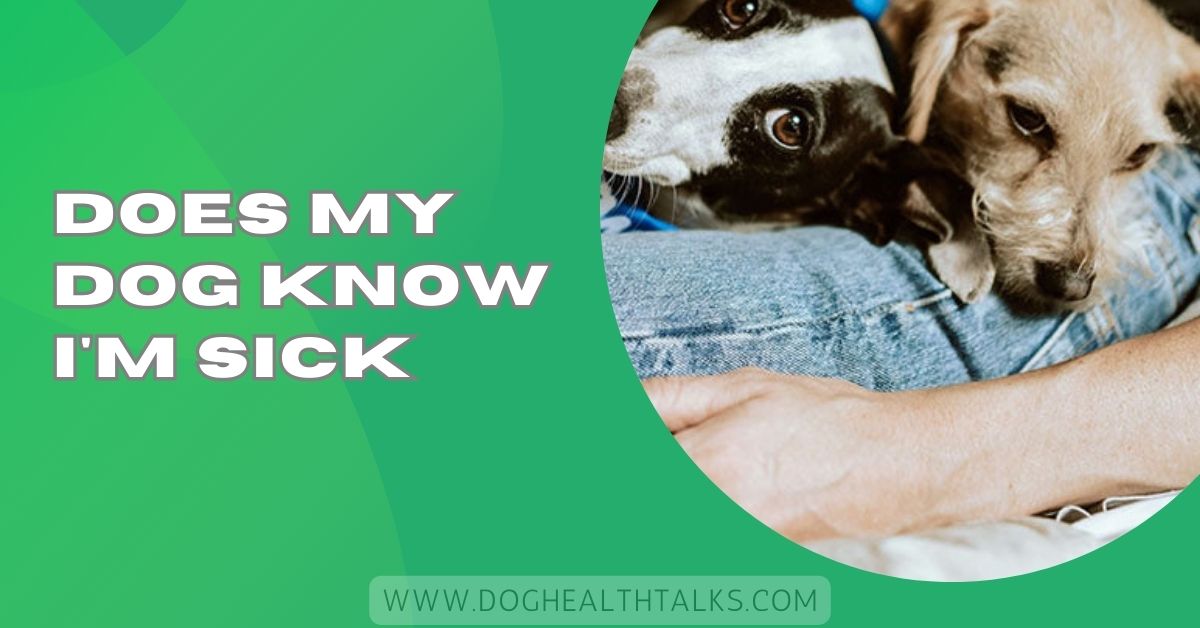Does My Dog Know I’m Sick – 10 Ways They Sense Illness!
Dogs have a fantastic way of knowing when something is wrong with us. Whether it’s a cold or something more serious, they sense our discomfort and respond with love.
Dogs can pick up on changes in your scent, behavior, and emotions, often before you feel unwell. Their keen noses can detect subtle chemical shifts caused by illness, while their close bond helps them notice when something feels “off.”
This article explains how dogs detect illness, the science behind their behavior, and the emotional connection that makes them our loyal, four-legged caregivers.
Do Dogs Know When You’re Sick?
Many dogs know when their owner is unwell, and science backs it up. They can notice small changes in your scent, movement, and behavior that most people wouldn’t pick up on.
If you usually walk with energy but start moving slowly or resting more, your dog may stay close or oversee you. They might also act more protective or affectionate.
This awareness comes from thousands of years living alongside humans, learning to read our signals for survival and bonding. Your dog doesn’t need words — they pick up on cues from your body and emotions.
Whether it’s a mild cold or something more serious, they often respond by offering comfort in the way they know best: staying near, lying beside you, or gently nudging you. Their instinct and love combined make them more in tune with you than you might think.
Dogs Can Smell Illness

A dog’s nose is compelling — far more sensitive than a human’s. While we have about 5 million scent receptors, dogs can have up to 300 million.
Illness changes the body’s chemistry, creating new scents your dog can detect even if you can’t. For example, some trained dogs can sniff out cancer, low blood sugar, and infections from breath, sweat, or urine.
Even without training, many pets can sense something different in their owner’s smell when sick. This is why a dog might sniff you more than usual, focus on a specific part of your body, or stay close during recovery.
It’s not magic — it’s biology. Your unique scent is part of how your dog recognizes you daily, so when it changes, they take notice.
Their nose works like an early warning system, sometimes detecting health changes before you feel symptoms yourself.
Dogs Can Understand Body Language and Changes in Routine
Dogs are masters at picking up on your habits and body language. If you usually wake up early but start sleeping in, skip meals, or spend more time lying down, they notice.
Slight differences in how you move — slower walking, less energy, or different posture — can signal them that something’s off.
This awareness isn’t just instinct; it’s learned from watching you daily. Dogs thrive on routine, so they become curious or concerned when yours changes suddenly.
Some may follow you around to check on you, while others quietly stay near if needed. They don’t understand “illness” as humans do, but they recognize patterns and notice when they break.
This is why they’re quick to react to your sick days, adjusting their behavior to match your slower pace or need for rest.
How Dogs Behave When Their Human Is Sick
If your dog does sense something amiss, how might they react? Behavioral changes are the most visible signs to us. Some common observations include:
- Increased clinginess or closeness: staying near your side, trying to rest their head on you, following you from room to room
- Lethargy or subdued energy: matching your low energy, being less playful
- Refusing to leave you: lying close, sleeping next to you
- Changes in food or drinking behavior: sometimes dogs eat less or act subdued if tension or altered household routines are present
- Protectiveness or alertness: in some cases, dogs become more watchful or guard-like if they sense their owner is vulnerable
- Behavioral calmness: some dogs restrain their usual demands (less barking, less demanding play) when they sense you don’t have the energy
- Discomfort or anxiety: a few dogs can seem unsettled, restless, or worried if their human acts “off”
These behaviors suggest dogs respond adaptively — adjusting their interactions to your condition.
Dogs Can Read Human Emotions
Your dog doesn’t just notice how you look — they also sense how you feel. They can hear changes in your voice, see differences in your facial expressions, and even detect shifts in your body’s scent when emotions change.
Research shows that dogs can link a happy voice with a smiling face and a sad voice with a downcast look.
If you’re stressed, anxious, or upset, your dog may respond by cuddling closer, acting calmer, or following you more.
Some dogs even mirror your emotions, becoming quieter when you’re sad or more alert when you’re nervous. This deep emotional awareness is part of what makes dogs such comforting companions.
They aren’t just reacting to illness — they’re responding to the feelings that come with it, offering their presence as a simple but powerful form of support.
Why Do Dogs Comfort Sick People?

Dogs comfort sick people because of a mix of instinct, bonding, and positive reinforcement. Instinctively, staying close to a vulnerable pack member helps keep them safe — a behavior rooted in their wild ancestors.
Personally, your dog loves you and feels connected to you, so they want to be near when you’re not feeling well.
They may also have learned that comforting you leads to positive reactions, like petting, soft words, or treats, which encourages the behavior.
Beyond that, some studies suggest dogs can sense chemical changes in our bodies when we’re sick, such as shifts in hormones or stress levels, and they respond by trying to soothe us.
Whether it’s lying by your side, resting their head on your lap, or following you around the house, their comfort is a mix of love and instinct — and it works both ways, helping you feel better emotionally while giving them purpose.
Top 7 Signs Your Dog Loves You
- Follows you from room to room, even when nothing exciting is happening.
- Sleeps close to you or in the same room at night.
- Greets you with a wagging tail, excited jumps, or happy barks.
- Makes prolonged, soft eye contact without looking away.
- Brings you their favorite toy as a gift or invitation to play.
- Checks on you when you’re resting or unusually quiet.
- Cuddles against you or rests their head on your lap or chest.
The Big Picture: What Science Suggests (And What Remains Unknown)
To summarize the evidence:
- Dogs have the anatomical and physiological capability to detect extremely subtle chemical cues in the environment, thanks to their powerful olfactory systems.
- Experimental research confirms dogs can detect certain illnesses and stress in humans under controlled conditions.
- Dogs likely combine scent cues with visual, auditory, and emotional information to detect when their human is off.
- But there’s a lot we don’t know: accuracy in everyday settings, disease specificity, individual variation, and how reliably an untrained pet dog can perceive illness.
At heart, a more cautious and realistic statement might be: Dogs can often tell when something about their human is “off” — and they respond to that. Whether that “offness” is illness, stress, or fatigue, dogs may not always distinguish precisely, but they do appear to notice.
Canine Body Language
Dogs use body language to show feelings. A relaxed wagging tail, gentle pawing, or resting their head on you often means affection.
Ears pulled back softly, and calm eye contact shows they trust you. Watching these small cues helps you understand your dog’s emotions better.
How Do Dogs Act When They Smell Cancer
When a dog detects cancer, they may sniff the same spot repeatedly, paw at it, or show unusual interest. Some might stay close or become more protective.
This happens because cancer can create unique scents your dog’s intense nose can pick up, sometimes before symptoms are visible.
What Do Dogs Do When You’re Sick With a Cold
Dogs often become gentle and quiet when you have a cold. They may lie beside, follow, or sniff you more often.
Their calm presence can bring comfort, making sick days feel less lonely while showing their instinct to stay close when you’re unwell.
I’m Sick And My Dog Won’t Leave My Side
If your dog refuses to leave your side while you’re sick, it signifies loyalty and concern. They sense something’s wrong and want to protect or comfort you. Staying close helps them feel connected to you and reassured they’re doing their part to help.
Can Dogs Tell When You’re Sick With a Cold

Yes. Even mild colds change your scent and daily behavior. Dogs notice slower movements, sneezing, or longer rest times.
In response, they often act calmer, sit nearby, or follow you closely. This is their way of staying connected and keeping watch while you recover.
Can Dogs Sense Sickness Or Death
Dogs can detect sickness and sometimes sense approaching death. They use smell, body language, and emotional cues to notice changes.
Many respond by staying close, becoming protective, or acting quietly. Their natural sensitivity helps them recognize essential shifts in your health and mood.
Does My Dog Know I Love Him
Dogs feel love through your actions. Gentle touch, kind words, playtime, and care show them they’re important to you.
They respond with loyalty, affection, and trust. Consistent positive attention builds a deep bond, so your dog understands your love even without spoken words.
Do Dogs Know If You Have Cancer
Some dogs can detect cancer through scent changes in breath, skin, or bodily fluids. They may show unusual interest in one area, sniff repeatedly, or stay close.
While not replacing medical tests, their behavior can sometimes alert owners to seek professional evaluation.
Can Dogs Smell Infection In Humans
Yes. Infections can produce unique odors that dogs detect easily. Your dog may sniff more than usual, act curious, or focus on a specific body part.
These reactions often come from their ability to pick up subtle scent changes caused by bacteria or inflammation in the body.
Can Your Dog Sense When You’re Sick?
Yes. Dogs notice changes in your scent, movement, and mood when you’re sick. Their sharp senses pick up on even subtle differences.
Many will stay close, act calmer, or follow you around. It’s their way of showing care and ensuring you’re safe while recovering.
Can My Dog or Cat Tell When I’m Sick?
Both dogs and cats can often tell when you’re unwell. They sense changes in smell, routine, and body language.
Pets may respond by staying nearby, acting gentle, or offering comfort. These instincts come from their natural awareness and the close bond they share with you.
Does Your Dog Know When You Are Sick or Sad?
Yes. Dogs can read emotions through voice, facial expressions, and body language. They also detect scent changes when you’re sick.
If you’re sad or unwell, many dogs become calmer, cuddle closer, or observe you, offering quiet support and reassurance in their own simple, loving way.
What Do Dogs Do When You’re Sick With A Cold
When you have a cold, your dog may stay close, cuddle more, and act calm. They sense your low energy and try to comfort you with quiet companionship and gentle affection.
Does My Dog Know I Have Cancer
Dogs can sometimes detect body changes caused by cancer through their sense of smell. They may sniff, lick, or focus on certain areas more often, but they don’t actually understand the illness — they just notice something unusual.
Does My Dog Know I’m Dying
Dogs can often sense when their owner is very ill or near the end of life. They may stay beside you, act gently and protectively, and provide quiet comfort through their presence and loyalty.
Does My Dog Know When I’m Sad
Yes, dogs can sense sadness through your tone, facial expressions, and behavior. They often respond by snuggling, licking, or sitting close to offer love, comfort, and emotional support when you’re feeling down.
FAQs
1. How Do Dogs Act When You’re Sick?
Dogs may follow you closely, act calmer, or cuddle more. They notice changes in scent, energy, and mood, responding with quiet comfort and protection.
2. What Do Dogs Do If They Think You Are Sick?
They often stay near, watch you closely, and offer affection. This instinct comes from their pack nature, wanting to keep you safe and cared for.
3. Do Dogs Get Clingy When You Are Sick?
Yes. Many dogs become extra clingy, following you around or lying beside you. It’s their way of offering comfort and ensuring you’re not alone.
4. How Do Dogs Act When They Sense Illness?
They may sniff more, watch you intently, act gentle, or stay close. Dogs pick up on scent and behavior changes, responding with loyalty and care.
5. Can Dogs Sense Sickness Or Death In Humans?
Yes. Dogs detect changes in scent, body language, and energy. Some may become protective, quieter, or clingy, sensing something is wrong before you notice.
6. Is my dog trying to tell me I’m sick?
Yes, your dog might act differently, stay close, or seem worried because they sense changes in your scent or behavior.
7. How do dogs act when they smell illness?
Dogs may sniff you more, act protective, stay close, or seem anxious when they notice strange scents linked to sickness.
8. What is the 7 7 7 rule for dogs?
The 7-7-7 rule means introducing dogs to seven new people, places, and experiences each week during early puppy socialization.
9. Do dogs know when you are sleeping?
Yes, dogs notice your breathing, stillness, and scent changes when you sleep, so they often stay calm or guard quietly nearby.
10. Is your dog trying to tell you something?
Yes, dogs communicate with looks, barks, or actions to express needs such as food, play, comfort, or when something feels wrong.
Conclusion
Dogs have an incredible way of knowing when something isn’t quite right with us. They often pick up on illness before we do, whether through their powerful sense of smell, their ability to read our body language, or the deep emotional bond we share. Their response—staying close, offering comfort, or simply keeping watch—isn’t just instinct, it’s love in its purest form. These loyal companions remind us daily that we’re never truly alone, and their quiet presence can be one of the most healing parts of being unwell.






